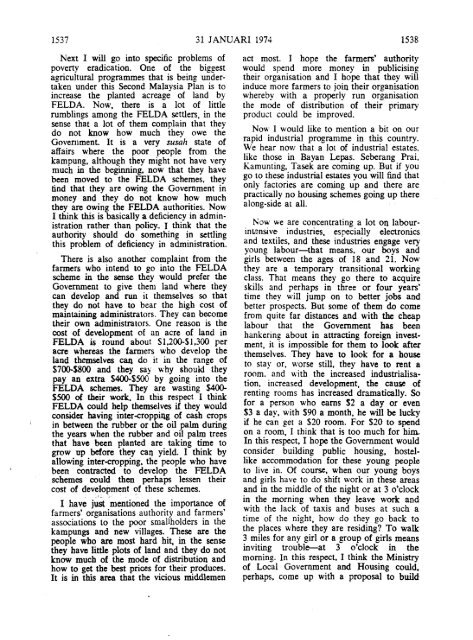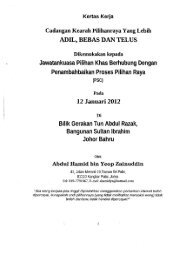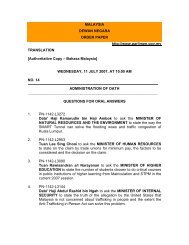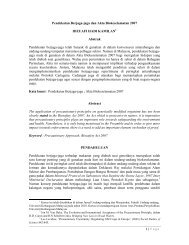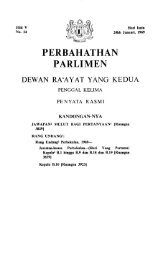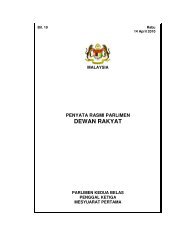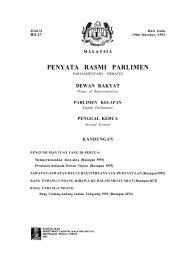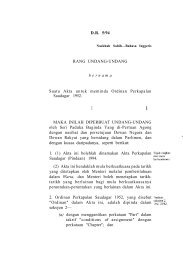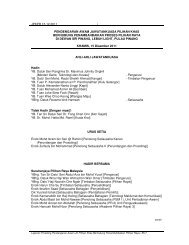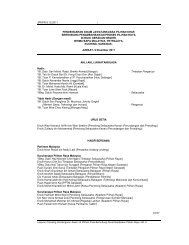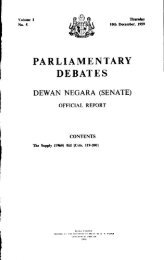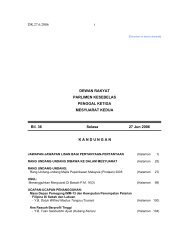PENYATA RASMI - Parlimen Malaysia
PENYATA RASMI - Parlimen Malaysia
PENYATA RASMI - Parlimen Malaysia
Create successful ePaper yourself
Turn your PDF publications into a flip-book with our unique Google optimized e-Paper software.
1537 31 JANUARI 1974<br />
Next I will go into specific problems of<br />
poverty eradication. One of the biggest<br />
agricultural programmes that is being undertaken<br />
under this Second <strong>Malaysia</strong> Plan is to<br />
increase the planted acreage of land by<br />
FELDA. Now, there is a lot of little<br />
rumblings among the FELDA settlers, in the<br />
sense that a lot of them complain that they<br />
do not know how much they owe the<br />
Government. It is a very susah state of<br />
affairs where the poor people from the<br />
kampung, although they might not have very<br />
much in the beginning, now that they have<br />
been moved to the FELDA schemes, they<br />
trod that they are owing the Government in<br />
money and they do not know how much<br />
they are owing the FELDA authorities. Now<br />
I think this is basically a deficiency in administration<br />
rather than policy. I think that the<br />
authority should do something in settling<br />
this problem of deficiency in administration.<br />
There is also another complaint from the<br />
farmers who intend to go into the FELDA<br />
scheme in the sense they would prefer the<br />
Government to give them land where they<br />
can develop and run it themselves so that<br />
they do not have to bear the high cost of<br />
maintaining administrators. They can become<br />
their own administrators. One reason is the<br />
cost of development of an acre of land in<br />
FELDA is round about $1,200-$1,300 per<br />
acre whereas the farmers who develop the<br />
land themselves can do it in the range of<br />
$7004800 and they say why should they<br />
pay an extra $404-$500 by going into the<br />
FELDA schemes. They are wasting $400-<br />
$500 of their work, In this respect I think<br />
FELDA could help themselves if they would<br />
consider having inter-cropping of cash crops<br />
in between the rubber or the oil palm during<br />
the years when the rubber and oil palm trees<br />
that have been planted are taking time to<br />
grow up before they can yield. I think by<br />
allowing inter-cropping, the people who have<br />
been contracted to develop the FELDA<br />
schemes could then perhaps lessen their<br />
cost of development of these schemes.<br />
I have just imentioned the importance of<br />
farmers' organisations authority and farmers'<br />
associations to the poor smallholders in the<br />
kampungs and new villages. These are the<br />
people who are most hard hit, in the sense<br />
they have little plots of land and they do not<br />
know much of the mode of distribution and<br />
how to get the best prices for their produces.<br />
It is in this area that the vicious middlemen<br />
1538<br />
act most. I hope the farmers' authority<br />
would spend more money in publicising<br />
their organisation and I hope that they will<br />
induce more farmers to join their organisation<br />
whereby with a properly run organisation<br />
the mode of distribution of their primary<br />
product could be improved.<br />
Now I would like to mention a bit on our<br />
rapid industrial programme in this country.<br />
We hear now that a lot of industrial estates,<br />
like those in Bayan Lepas. Seberang Prai,<br />
Kamunting, Tasek are coming up. But if you<br />
go to these industrial estates you will find that<br />
only factories are coming up and there are<br />
practically no housing schemes going up there<br />
along-side at all. :<br />
Now we are concentrating a lot on labourintensive<br />
industries, especially electronics<br />
and textiles, and these industries engage very<br />
young labour--that means, our boys and<br />
girls between the ages of 18 and 21. Now<br />
they are a temporary transitional working<br />
class. That means they go there to acquire<br />
skills and perhaps in three or four years'<br />
time they will jump on to better jobs and<br />
better prospects. But some of them do come<br />
from quite far distances and with the cheap<br />
labour that the Government has been<br />
hankering about in attracting foreign investment,<br />
it is impossible for them to look after<br />
themselves. They have to look for a house<br />
to stay or, worse still, they have to rent a<br />
room. and with the increased industrialisation,<br />
increased development, the cause of<br />
renting rooms has increased dramatically. So<br />
for a person who earns $2 a day or even<br />
$3 a day, with $90 a month, he will be lucky<br />
if he can get a $20 room. For $20 to spend<br />
on a room, I think that is too much for him.<br />
In this respect, I hope the Government would<br />
consider building public housing, hostellike<br />
accommodation for these young people<br />
to live in. Of course, when our young boys<br />
and girls have to do shift work in these areas<br />
and in the middle of the night or at 3 o'clock<br />
in the morning when they leave work and<br />
with the lack of taxis and buses at such a<br />
time of the night, how do they go back to<br />
the places where they are residing? To walk<br />
3 miles for any girl or a group of girls means<br />
inviting trouble--at 3 o'clock in the<br />
morning. In this respect, I think the Ministry<br />
of Local Government and Housing could,<br />
perhaps, come up with a proposal to build


